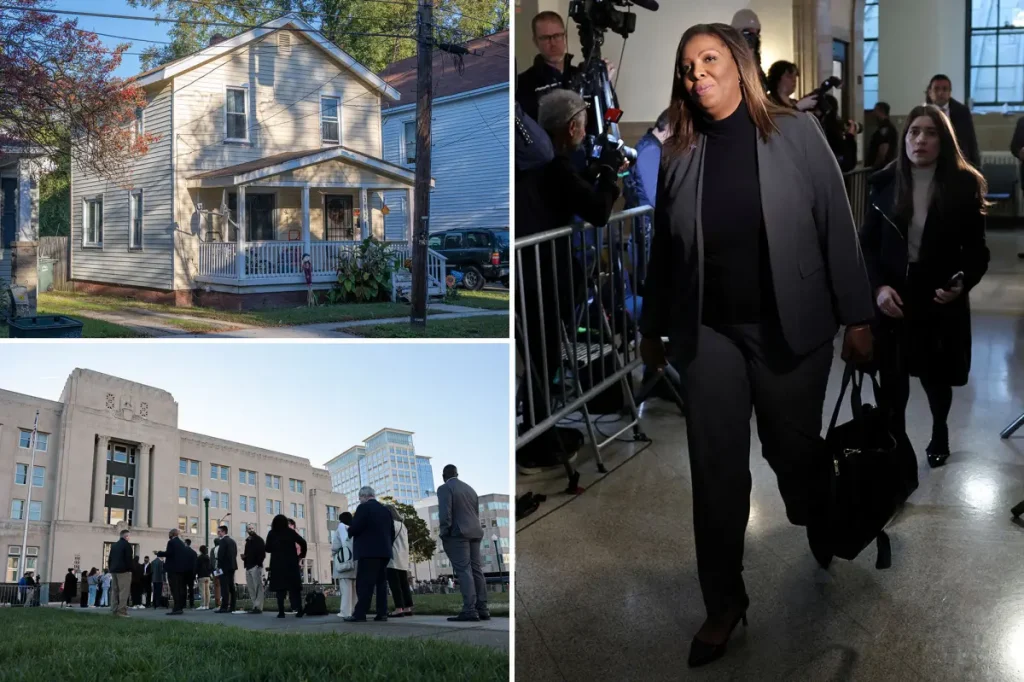New York Attorney General Letitia James Pleads Not Guilty to Federal Charges
In a brief but significant hearing at a federal courthouse in Norfolk, Virginia, New York Attorney General Letitia James pleaded not guilty to two federal charges related to a property purchase she made in 2020. Appearing confident and composed, James was charged with bank fraud and making a false statement to a financial institution in connection with her purchase of a three-bedroom house on Peronne Avenue in Norfolk. The indictment alleges that James designated the property as a second home that she would occupy, which allowed her to secure more favorable mortgage terms, when in reality the home was being used as a rental property for her grandniece. Outside the courthouse, James was greeted by supporters chanting “We stand with Tish!” as she maintained that the charges against her are baseless.
At the heart of this case is the allegation that James benefited financially from misrepresenting the nature of her property purchase. Prosecutors claim that by signing a second home rider indicating she would be the “sole borrower to occupy and use the property,” James obtained better mortgage terms that saved her approximately $19,000. However, according to the indictment, the home was never occupied by James but instead served as a rental investment property for her grandniece, Nakia Thompson. This apparent discrepancy was highlighted by New York State ethics filings where James listed the residence as an “investment” property that generated between $1,000 and $5,000 in rental income since 2020. Interestingly, James only began listing the home as an asset in May of this year, coinciding with when she was referred to the Department of Justice for prosecution regarding allegedly false statements related to another Norfolk area property purchase in 2023.
The timing of this indictment has raised questions about potential political motivations, particularly given James’ high-profile legal battles with former President Donald Trump. In her initial statement following the indictment, James characterized the charges as “a continuation of the president’s desperate weaponization of our justice system,” suggesting that Trump was “forcing federal law enforcement agencies to do his bidding” in retaliation for her work as New York State Attorney General. This reference points to James’ significant legal victory against the Trump Organization last year, where she won a civil judgment against Trump for allegedly inflating the value of his real estate empire. That judgment initially ordered Trump to pay $355 million in penalties, though it was successfully appealed and thrown out in August. James’ office has since appealed for the reinstatement of the judgment, which had grown to more than $500 million with interest.
The indictment comes at a politically sensitive time, with James serving as one of the most prominent Democratic state attorneys general in the country. At 67 years old, she has built a reputation as a fierce advocate for consumer protection and as someone willing to take on powerful interests, including Trump and his business empire. During the brief court appearance, James was represented by high-profile attorney Abbe Lowell, known for defending clients in politically charged cases. While James only spoke briefly during the hearing to confirm she understood her rights and to enter her not guilty plea, her demeanor appeared upbeat, suggesting confidence in her legal position despite the serious nature of the charges she faces.
Local residents who live on the same street as James’ Norfolk property have added another dimension to the case, telling reporters they have never seen the state Attorney General visiting the home. This testimony from neighbors seems to support the prosecution’s contention that James did not use the property as a second home as claimed on her mortgage documents. The property in question, purchased with a $109,600 loan on August 17, 2020, has apparently been consistently occupied by her grandniece rather than James herself. The question at the center of the case isn’t whether James owned the property—that fact isn’t disputed—but rather how she represented her intended use of the property to financial institutions and whether that representation was deliberately misleading to obtain financial advantages.
As this case develops, it highlights the intersection of personal financial dealings and public office, raising questions about the standards to which elected officials should be held. For James, who has built her career on holding others accountable for financial improprieties, these charges present both legal and reputational challenges. The case also underscores the increasingly contentious relationship between Trump and those who have investigated him, with each side accusing the other of weaponizing the legal system for political purposes. While James maintains her innocence and characterizes the charges as politically motivated, prosecutors will need to prove that she knowingly made false statements with the intent to defraud financial institutions. As the legal process unfolds, this case will likely continue to attract significant attention given James’ prominent position and her ongoing legal battles with the former president.


